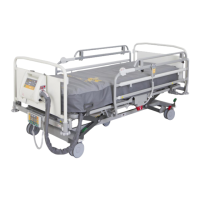6 Setup
6.1 Transport
For safe transport, observe the following:
Ensure no cables are run over when moving a bed.
Ensure the mains cable is attached with a hook (at the head end of the bed).
Ensure the castors are unlocked before moving the bed during the loading/unloading process (see Castor
Control and Bed Transport).
Ensure the side rails are lifted and locked while the patient is on the bed during the transport.
Move the bed only on suitable floor surfaces.
Suitable surfaces:
Tile
Hard linoleum
Hard flooring
Unsuitable surfaces:
Soft, unsealed or defective flooring
Soft wooden flooring
Soft and porous stone floors
Carpeted floors with underlay
Soft linoleum
For longer distances, ensure the castor steering function (main control) is activated.
Ensure the brakes are released while moving the bed.
6.2 Setup
Set up the bed as follows:
Unpack the bed.
Check the delivery (see Scope of Delivery).
Remove isolating foil from mains control box (see Removing Isolating Foil).
Install equipment and accessories (see Assembly).
In case of delivery with dismounted bed ends, mount the head and foot ends (see Bed Ends).
Set-up the bed only on a suitable floor surface (see Transport).
Ensure the mains cable does not collide or get stretched when adjusting the bed. Check the plug is
inserted correctly.
Do not leave any extension cords or power strips loose on the floor.
Ensure all the required mechanical and electrical prevention mechanisms are available on site.
There is no mains switch on the bed, i.e. the mains cable is the only means to isolate the bed from the
mains.
Ensure the mains cable is always accessible.
The plug on the mains cable should only be changed and maintained by qualified and trained service
technicians authorised by the manufacturer.

